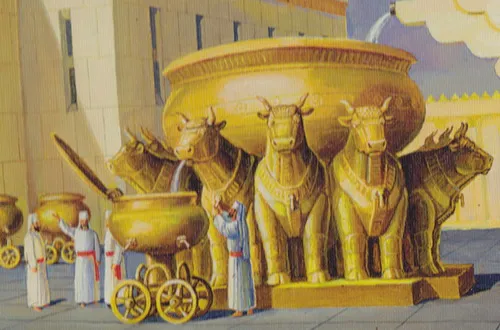King ahaz closed the temple story – राजा आहाज ने मन्दिर बन्द कर दिया कहानी
The story of King Ahaz, who ruled Judah from approximately 732 to 716 BCE, is a cautionary tale of apostasy and the consequences of abandoning faith. Ahaz is remembered for his unfaithfulness to Yahweh and his misguided religious policies, including the closure of the Temple in Jerusalem.
Ahaz ascended to the throne of Judah during a turbulent period marked by political instability and external threats. Unlike his predecessors, who mostly adhered to the worship of Yahweh, Ahaz pursued a path of idolatry and syncretism, heavily influenced by the pagan practices of neighboring nations.
One of the most notorious aspects of Ahaz’s reign was his adoption of the worship practices of foreign gods. He constructed high places for idol worship throughout Judah, participated in the detestable practices of the Canaanites, including child sacrifice, and introduced various forms of idol worship into the land.
The most significant and disastrous act of King Ahaz’s religious apostasy was the closure of the Temple of Yahweh in Jerusalem. This decision symbolized his complete rejection of the covenantal worship of Yahweh and his embrace of paganism. The key events associated with the closure of the Temple include:
– After visiting Damascus and being impressed by the Assyrian king Tiglath-Pileser III, Ahaz ordered a replica of a pagan altar to be constructed in Jerusalem. He replaced the bronze altar used for Yahweh’s worship with this new altar, signaling a shift in religious allegiance.
– Ahaz desecrated the sacred vessels of the Temple, using them in pagan rituals or melting them down to pay tribute to the Assyrian king. This act not only demonstrated his disregard for the sanctity of the Temple but also weakened the religious and cultural identity of Judah.
– Ultimately, Ahaz closed the doors of the Temple, effectively halting all traditional worship of Yahweh. The Temple, once the center of religious life and a symbol of God’s presence among His people, was abandoned and left to decay.
Ahaz’s actions had profound and far-reaching consequences for Judah:
– Ahaz’s alliance with Assyria, intended to secure protection against enemies like Israel and Aram, resulted in Judah becoming a vassal state. The heavy tribute demanded by Assyria drained Judah’s resources and undermined its sovereignty.
– The closure of the Temple and the promotion of idolatry led to a significant decline in the spiritual life of the nation. The people’s faith in Yahweh weakened, and moral corruption spread throughout the land.
– According to the biblical narrative, Ahaz’s actions brought divine judgment upon Judah. Prophets like Isaiah and Micah warned of the impending consequences of the nation’s unfaithfulness, predicting disaster and exile.
King Ahaz’s reign left a legacy of spiritual ruin and political subjugation. However, his son and successor, Hezekiah, would later undertake extensive religious reforms to reverse the damage caused by Ahaz. Hezekiah reopened the Temple, cleansed it of idolatrous practices, and restored the worship of Yahweh, leading Judah back to the covenantal faith.
The story of King Ahaz closing the Temple serves as a powerful reminder of the dangers of abandoning one’s faith and the severe consequences of apostasy. Ahaz’s reign illustrates the impact of unfaithful leadership on a nation’s spiritual and moral fabric. Yet, it also sets the stage for the redemptive efforts of leaders like Hezekiah, who sought to restore faith and righteousness in the land. This narrative encourages readers to remain steadfast in their beliefs and to recognize the importance of faithful worship and devotion to God.
King ahaz closed the temple story – राजा आहाज ने मन्दिर बन्द कर दिया कहानी



